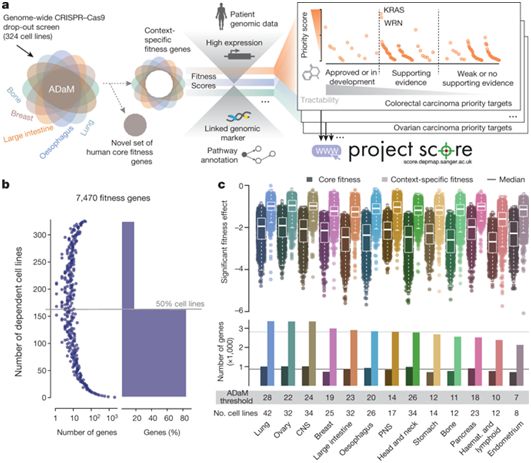Recently, researchers from the University of Cambridge's Welkom Foundation's Sanger Institute and Open Targets have used the CRISPR/Cas9 technology to destroy more than 300 cancer types from 30 cancer types. Each gene in a cancer model finds thousands of key genes necessary for cancer to survive. The researchers then developed a new system to prioritize the 600 most promising drug targets for developing treatments. These results accelerate the development of targeted therapies and bring scientists closer to building a Cancer Dependency Map (a detailed manual on precise cancer treatment rules) designed to help more patients receive effective treatment. The relevant research results were published online in the journal of Nature.
Every two minutes, someone in the UK is diagnosed with cancer, and in every two people, one person develops cancer at some point in life. Surgical removal, chemotherapy, and radiation are commonly used to treat cancer, although these methods can effectively kill cancer cells, some patients do not respond to treatment, and healthy tissue can also suffer damage, leading to unwanted side effects. Scientists and pharmaceutical companies are exploring new targeted therapies that selectively kill cancer cells without damaging healthy tissue.
In this new study, these researchers have performed one of the largest CRISPR/Cas9 screenings on oncogenes to date, destroying nearly 20,000 genes from more than 300 cancer models from 30 cancer types in order to discover which genes are critical to cancer survival. They focus on common cancers (such as lung, colon, and breast cancer) and cancers that require new treatments because of their clinical dissatisfaction (eg, lung, ovarian, and pancreatic cancers).
The researchers identified thousands of key oncogenes and developed a prioritization system that narrowed the list of oncogenes to about 600 of the most promising genes for drug development.
One of the most ranked targets present in many different cancer types is Werner syndrome RecQ helicase (WRN). The researchers found that cancer cells with defective DNA repair pathways -- microsatellite unstable cancer -- require WRN to survive. Microsatellite instability occurs in many different cancer types, including 15% colon cancer and 28% gastric cancer. The newly discovered WRN, as a promising drug target, provides an exciting opportunity to develop the first batch of cancer treatments that target WRN.
'The CRISPR/Cas9 is a very powerful tool that allows us to conduct scientific research with scale and precision that could not be achieved five years ago,’ said Dr. Kosuke Yusa, co-author of the paper and Dr. Kosuke Yusa of the Sanger Institute at the Welkom Foundation, ‘we have found a very exciting opportunity to develop new drugs for cancer with CRISPR.'
Reference
Fiona M. Behan et al. Prioritization of cancer therapeutic targets using CRISPR–Cas9 screens. Nature, 2019.


